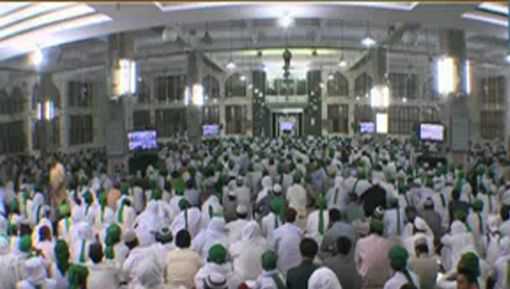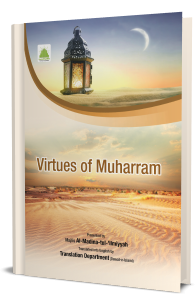
Question and Answer of Madani Muzakarah
1. Fasting in Muharram
Q: Besides the fasts of Ashura (9th and 10th) in Muharram, does fasting in this sacred month hold any virtues?
A: The Beloved Prophet صَلَّى الـلّٰـهُ عَلَيْهِ وَاٰلِهٖ وَسَلَّم said:
1. After Ramadan, the fast of Muharram is most superior, and after the prescribed salahs, supererogatory salah in the night (qiyam al-layl) is most superior, (Muslim, p. 456, Hadith 2755).
2. The fast of each day of Muharram is equal to fasting for an entire month, (Mu’jam Sagheer, vol. 2, p. 71; Madani Muzakarah 1st Muharram-ul-Haraam 1441 AH).
2. Consuming Fish in Muharram
Q: Can fish be cooked and eaten after the moon of Muharram has been sighted?
A: Yes! Fish, chicken, meat, and all other halal foods can be eaten, (Madani Muzakarah, 2nd Muharram-ul-Haraam, 1441 AH).
3. Not Eating Fish or Wearing New Clothes in Muharram
Q: Is it permissible to deliberately refrain from eating fish or to deem it bad to wear new clothes in Muharram?
A: If a person does not consume fish and considers it wrong to wear new clothes in Muharram because he treats this month as a month of mourning, he will be sinful. It is common among the public not to eat meat on Ashura. In Bab-ul-Madinah (Karachi), where our old home was located, the meat shops would remain closed on Ashura. Gradually, more and more shops began to stay open on Ashura until eventually, the custom of keeping meat shops closed came to an end. Even today, some people do not consume meat on the Day of Ashura, but they probably consume meat Kichra[1]. There is no moment in Muharram or the entire year when it is prohibited in Islam to eat fish or meat, (Madani Muzakarah, 5th Muharram-ul-Haraam, 1440 AH).
4. Visiting Karbala
Q: When did you visit Karbala?
A: I do not recall the year in which I visited Karbala; many years have passed since then. I travelled to Baghdad twice during my life, and visited Karbala on both occasions, (Madani Muzakarah, 2nd Muharram-ul-Haraam, 1441 AH).
5. Describing this Month as ‘Muharram-ul-Haraam’
Q: Why is the word ‘Haraam’ added to the word ‘Muharram’ in ‘Muharram-ul-Haraam’?
A: The word ‘Haraam’ in this context literally means ‘sacred,’ i.e. Muharram the Sacred Month. Similarly, the masjid in which the Ka’bah is located is called ‘al-Masjid-ul-Haraam,’ i.e. The Sacred Masjid, (Madani Muzakarah, 2nd Muharram-ul-Haraam, 1441 AH).
6. The Practice of Conveying Rewards to the Deceased (Isal-al-Thawab).
Q: Do our deceased loved ones receive rewards when we go to their graves and make Du’a and recite the Quran for them?
A: Just as the deceased receive the reward of our prayers of forgiveness for them and the funeral prayers we offer for them, they also receive the reward of our Quran recitation when we read Surah Ikhlaas for them, or ask someone else to recite the Quran – this is Isal-al-Thawab and it is a praiseworthy practice. Rejecting it is a sin, and the one who does so is misguided, (See: Fatawa Razawiyyah, vol. 9, pp. 590-592). When Islam has declared Isal-al-Thawab to be permissible, then how can we reject it! (Madani Muzakarah, 2nd Muharram-ul-Haraam, 1441 AH).
7. The Deceased Hear and See
Q: If we go to the cemetery on Thursday or Friday and speak to those in the grave, do they hear us?
A: Whether it is Thursday, Friday, or any other day, the inhabitants of graves can hear and see. In fact, their audition and vision are more powerful than those in the world; even if the deceased is a non-Muslim, he can see and hear, (Bukhari, vol. 3, p. 11, Hadith 3976, selected). The deceased feel joy when they are visited by people they loved in the world, (See: Jazb-ul-Quloob, p. 197; Madani Muzakarah, 2nd Muharram-ul-Haraam 1441 AH).
8. Sighting the Moon of Muharram from the In-law’s Home
Q: How correct is the following matter: The newlywed bride should not sight the moon of Muharram or Safar at her in-law’s home in the first year after marriage.
A: This is a baseless notion. Hypothetically speaking, if the newlywed bride had weak eyesight, was blind or her home was in a plaza, then how would she see the moon at her parent’s home? Also, if her parents have passed away and she has no next of kin, will she be sent to a women’s shelter in order to sight the moon? Remember! There is no harm for the newlywed bride to sight the new moon of Muharram or Safar in the first year of marriage while she is at her in-law’s home. These widespread superstitions must be eradicated, (Madani Muzakarah, 5th Muharram-ul-Haraam 1440 AH).
9. Pakistan is a Fortress of Islam
Q: Nowadays, people prefer purchasing foreign-produced goods and disdain nationally manufactured products, often remarking, ‘Don’t buy it, it is Pakistani.’ What is your opinion regarding this?
A: Pakistan is the fortress of Islam! There are countless masjids in Pakistan; you will be hard-pressed to find as many salah-offering people outside of Pakistan as there are within it. Moreover, there are no restrictions on mentioning the name of Allah Almighty and His Messenger صَلَّى الـلّٰـهُ عَلَيْهِ وَاٰلِهٖ وَسَلَّم in Pakistan, it is a hub of religious activities, and مَاشَــآءَالـلّٰـه one cannot serve the religion as freely outside of Pakistan as they can within it. Do people not see all of this? If a Pakistani company has committed fraud, then that is no fault of the country; all of the blame is upon the company because they have committed fraud and sold defective products.
If you are from Pakistan, then be a true Pakistani. Those who are disloyal to their country, speak ill of it, and give reasons for others to malign it, should refrain from this. Remember! A person’s homeland is their homeland, one’s country is their own country, and those who harm it are only harming themselves. اَلْـحَمْـدُ لـِلّٰـه, Pakistan is a very good country, (Madani Muzakarah, 20th Safar-ul-Muzaffar, 1441 AH).
[1] A traditional dish prepared with rice, lentils, and meat.


















Comments